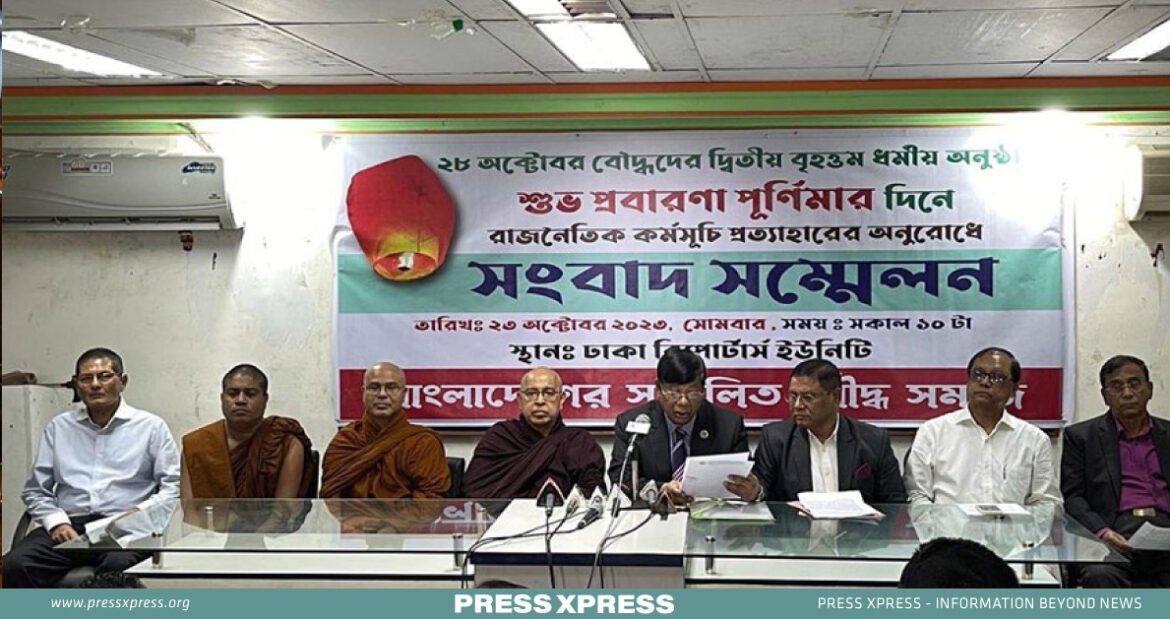Bangladesh Buddhist Federation has requested all political parties including BNP, Jamaat and Awami League to withdraw their planned political rallies on October 28, as the date coincides with Prabarana Purnima, which is the second-largest religious festival for the Buddhist community.
Bangladesh Buddhist Federation President Dibyendu Bikash Chowdhury Barua and General Secretary Bhikkhu Sunandapriya, Principal of International Buddhist Monastery Bhadanta Dharmamitra Mahather and Vice-Principal Bhadanta Buddhananda Mahather made the request on Sunday in a joint statement.
You Can Also Read: BNP Woos Foreign God’s Blessings
“The people of the Buddhist community who will come from far will face many obstacles to participate in the festival in the Buddhist monastery due to the announcement of several political programs including a grand rally on the Prabarana Purnima day by BNP and some political parties,” the statement reads.
Therefore, in a country of communal harmony, a special request was made to withdraw all political programs on the Prabarana Purnima religious festival of Buddhists, it added.
The Buddhist community hopes to celebrate their Prabarana festival peacefully, free from political disruptions, and in an atmosphere of interfaith harmony.
‘BNP’s Final Push’: What Will Happen on October 28?
As BNP’s year-long campaign to oust the elected government with their movement has clearly failed to garner public support, the party now apparently preparing for final push starting from October 28.
BNP, Bangladesh Jamaat-e-Islami and their associates announced to hold a grand rally on the day at Capital’s Nayapaltan area seeking immediate unseat of the government.
BNP Secretary General Mirza Fakhrul Islam Alamgir said, “Our great journey will commence on October 28. We will stay firm in our commitment to oust this government.”
He said his party is going to launch a different type of movement involving the masses.
Many BNP leaders boasted that the day will be beginning of the end of this government. The party has long history of resorting to political violence including attacking minority groups to create sense of panic and instability.
According to a media report, BNP is looking to exert maximum pressure from October 28, which shall continue until November 7. BNP leaders and its loyalist media outlets are trying to propagate and show its October 28 rally as the “last day of this government” like they said before December 10 rally.
It may be mentioned that the last day of the BNP-Jamaat Islamist coalition government was October 28, 2006, when Prime Minister Khaleda Zia had tendered her resignation to President Iazuddin Ahmed, a loyalist of BNP.
Centering 28 October back then, tension prevailed in Dhaka city in particular as well as throughout the country. Awami League declared a rally while on the same day, BNP and Jamaat-e-Islami organized two separate rallies. The tensed head-to-head movements led to grave political violence including the killing of civilians.
Now again, the two sides are at loggerheads as October 28 draws near – speculations run rife in the public mind. Everyone is asking what will happen on October 28?
Citizens feared that BNP may unleash another episode of violent blockades and strikes. The extensive series of strikes and blockades executed by the BNP before and after the January 5, 2014 elections caused significant disruptions in daily life but fell short of accomplishing their objectives.
Awami League also announced to hold a peace rally at the south gate of Baitul Mukarram in the capital on the same day aiming to guard the city from any possible anarchy attempt.
Law enforcement agencies are also put in high alert to prevent any untoward situation centering the day as the Dhaka Metropolitan Police chief said that If anyone attempts to create violence, the DMP will handle the situation with an iron fist.”
Minorities In Despair With Past Of Political Violence
Tension ran high among minority communities in the country fearing that they will be subjected to violence amid political heat like past.
Bangladesh Puja Udjapan Parishad, an apex Hindu religious body that oversees nationwide Puja celebrations, recently expressed its fear during a media briefing of a repeat of the anti-Hindu violence in 2021 when about 100 Puja venues were vandalized over rumors of Quran desecration.
The group claimed that between October 2022 to this September, a total of 35 attacks on Hindu temples and properties were reported in the media. At least six were killed in the attacks.
Referring to the wave of attacks on minorities in the run up to national elections held in 2014 and earlier, Bangladesh Hindu Buddhist Christian Oikya Parishad recently held BNP and Jamaat-e-Islami responsible.
Advocate Rana Dasgupta, general secretary of Bangladesh Hindu Buddhist Christian Oikya Parishad, said: “In 1977, under BNP founder Gen Ziaur Rahman’s watch, the core tenets of a non-communal polity was destroyed.”
“Following the assassination of Father of the Nation Bangabandhu Sheikh Mujibur Rahman in 1975, successive regimes led by Gen Zia and Gen Ershad all went on an overdrive – introducing a Pakistan-style communal rule, and embracing communal forces,” he added.
One must consider the widespread repression of minorities between 2001 and 2006 under the then BNP-Jamaat government, as well as spate of attacks during the war crimes trial, Dasgupta said. The trend of reduction in Hindu population in Bangladesh occurred over five decades, he observed
During the elections earlier in January 2014, armed gangs attacked minority communities, mostly in the southwestern and northern districts, including Jessore, Satkhira, Thakurgaon, Panchagarh, Chittagong, Nilphamari, Kurgram, Lalmonirhat, Satkhira, Gaibandha and Dinajpur. International aid agencies estimated as many as 5,000 families were affected.
While most of those attacked were Hindu, other groups outside the Muslim Bengali majority were not spared either, such as indigenous Garo families in the district of Jamalpur. Some 27 different ethnic groups are registered and make up about 1 percent of the country’s population, though some indigenous groups calculate there are as many as 45.
As the election knocking the door and the two key political parties are still at loggerheads, minorities don’t want a repeat of another 2014.


